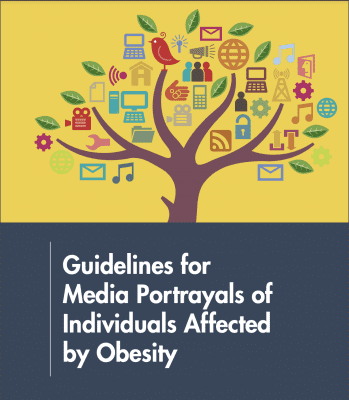Media
The way that obesity and body weight are portrayed by the media profoundly shape the public's understanding and attitudes about people with higher weight. Television, movies, and social media often reinforce negative attitudes about body weight and perpetuate societal weight stigma. For example, characters with larger bodies in popular TV shows and movies are often negatively stereotyped (e.g., portrayed as undisciplined, sloppy, unpopular, or blamed for their weight), depicted in stereotypical roles (e.g., overeating unhealthy foods and being lazy), or as one-dimensional characters in storylines that focus on their size or physical appearance. Viewing these stigmatizing media depictions worsens public attitudes and societal weight bias.
There are important opportunities for the media to help reduce negative stereotyping, body shaming, and personal blaming in portrayals of people with higher weight, and to increase respect and representation of people with diverse body sizes. The Rudd Center has created resources for media professionals, content creators, educators, and health professionals for the purpose of improving media content related to body weight and obesity and improving respectful portrayals of people of all body sizes.
You can also learn more about weight stigma in the media in this comprehensive report by the Media Empathy Foundation (MEF), and their recent collaborative efforts with the Rudd Center to encourage content creators to recognize and prioritize the need for accurate, inclusive, and empathetic portrayals of people of all sizes across all media channels.
Resources
Media Gallery
 Any time you use or arrange for use of a Rudd Center Video/Image for any approved purpose, credit must be given to the UConn Rudd Center for Food Policy and Health. Creators are welcome to use the images in the gallery for non-commercial purposes only, including:
Any time you use or arrange for use of a Rudd Center Video/Image for any approved purpose, credit must be given to the UConn Rudd Center for Food Policy and Health. Creators are welcome to use the images in the gallery for non-commercial purposes only, including:
- Television or digital news/media reporting;
- Noncommercial promotional materials (including, but not limited to videos promoting healthcare or community programs);
- Research and scientific purposes;
- Educational purposes; and
- Presentations to policymakers.
Media Guidelines
The media is an important and influential source of information about obesity. The way that obesity, weight-loss and weight maintenance are portrayed, described, and framed by the media profoundly shapes the public's understanding and attitudes toward these important health issues and the individuals affect by them.
As a result, the Rudd Center, in partnership with the Obesity Society and Obesity Action Coalition, created guidelines for media portrayals of individuals affected by weight bias or weight stigma.
Tips for Journalists
News coverage of obesity often portrays people living in larger bodies in stigmatizing or dehumanizing ways - both in the language that is used and the imagery that accompanies articles. The Journalist's Resource (a project of Harvard Kennedy School's Shorenstein Center on Media, Politics and Public Policy) interviewed Rebecca Puhl and other experts about this pervasive societal problem. Then, to help journalists reflect on their coverage and improve their work, they created a list of 6 tips to avoid stigmatizing news coverage
Video: Weight Discrimination
In July 2024, the Harvard T.H. Chan School of Public Health hosted a virtual event titled, "Unpacking Fatphobia, Weight Discrimination, and their Deady Repercussions." At the event, Rebecca Puhl, Jessamyn Stanley, and Stephanie Yeboah discussed how engaging with and elevating voices of people with lived experience is critical in efforts to tackle weight stigma. The team also created a Creator Toolkit to help professionals reframe conversations about this topic.
